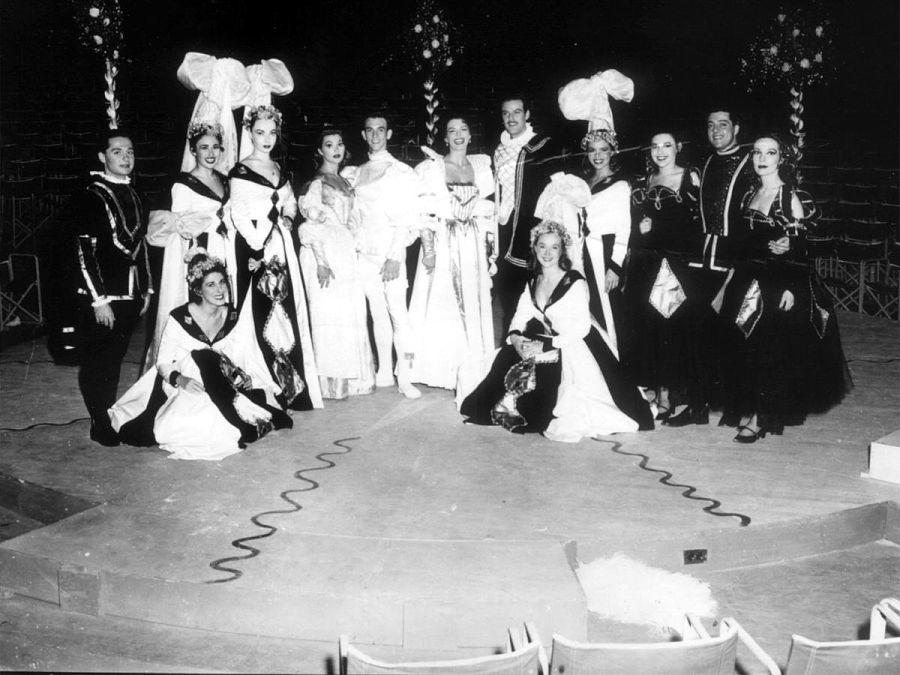225 YEARS AGO (1790)
Theatre managers Lewis Hallam and John Henry request permission from the General Court of Massachusetts to open a theatre, the first attempt since the Revolutionary War to repeal the 1750 law prohibiting theatrical performance. Although authorization is not granted, the move marks a shift in attitudes toward theatre: Before the war, it was associated with the English monarchy, but now citizens argue that access to such entertainment would be a marker of their newfound freedom.
170 YEARS AGO (1845)
Anna Cora Mowatt, the French-born American playwright known for her social satire Fashion, makes her stage debut as Pauline in The Lady of Lyons at the Park Theatre in New York City. Acting nationally and abroad, she will become the first upper-middle-class woman in the U.S. to have a performance career. She will go on to write, “For an American, and a woman, to aim at double distinction, as actress and dramatist, before a London tribunal, was, to say the least, a bold experiment.”
115 YEARS AGO (1900)
In response to the newly created Vaudeville Managers’ Association (later the United Booking Offices of America), which announced decreased pay for actors and the elimination of agents, eight performers gather at the Parker House in NYC to set up the White Rats, a vaudeville union. In less than a year, the Washington Post will call the White Rats “probably the most powerful organization of theatrical performers ever formed.”
75 YEARS AGO (1940)
Actor Frederick O’Neal and writer Abram Hill form the American Negro Theatre in Harlem as a way to showcase African-American theatre artists. At the company’s inception performances are held in a converted lecture room in the basement of the 135th Street Branch Library (which will later become the Schomburg Center for Research in Black Culture). Graduates of ANT’s acting program will include Sidney Poitier and Harry Belafonte.
60 YEARS AGO (1955)
North Shore Music Theatre, in Beverly, Mass., opens with the Cole Porter musical Kiss Me, Kate. The venue is designed by Boston architect Ralph LeBlanc as an arena with a roof supported by clear-span trusses to provide the best possible sightlines—the nation’s first permanent stage to use such a model.
55 YEARS AGO (1960)
Actors’ Equity Association advocates for a pension plan, and when no agreement is reached, the union shuts down Broadway’s The Tenth Man. The League of New York Theatres then closes the other 21 houses on the Great White Way, the first such occasion since Equity’s 1919 strike. Twelve days later, 19 productions return (three close permanently) after Mayor Robert Wagner Jr. lifts the amusement tax, instructing producers to fund pensions with the increased revenue.
50 YEARS AGO (1965)
New Heritage Theatre Repertory Company (later renamed New Heritage Theatre Group), established the previous year in Manhattan by founding artistic director Roger Furman, presents its first formal production, Furman and Don Brunson’s 1964 play Three Shades of Harlem, at the 125th Street YWCA. Earlier, the organization had focused on street theatre. The NHRTC will become the oldest black nonprofit theatre in NYC.
Cross and Sword by Pulitzer-winning dramatist Paul Green debuts at the St. Augustine Amphitheatre in Florida. In 1973 the Florida legislature will name the piece—depicting some of the region’s early European settlers, including Jean Ribault, Pedro Menéndez de Avilés and Father Francisco López de Mendoza Grajales—the official state play. The venue will continue presenting the piece until 1996.
35 YEARS AGO (1980)
After a two-week tour of California, Milcha Sánchez-Scott’s first play, Latina, premieres at the Pilot Theater in Los Angeles. The staging features an all-female creative and production team, and the cast is made up of 10 women of Latin American descent, including one undocumented immigrant.
30 YEARS AGO (1985)
Steppenwolf Theatre Company of Chicago brings its production of Lynn Siefert’s Coyote Ugly to the Kennedy Center in Washington, D.C., one of the troupe’s many trips outside the Windy City. The troupe’s travels began three years earlier with the NYC staging of True West featuring Steppenwolf ensemble members John Malkovich and Gary Sinise.
25 YEARS AGO (1990)
Controversy erupts surrounding Miss Saigon’s Broadway transfer, due to the casting of Jonathan Pryce, a white British actor, as the Engineer, a Eurasian character. High-profile Asian-American theatre artists such as B.D. Wong and David Henry Hwang express outrage at the choice, and Actors’ Equity Association calls for the role to be recast. In response, producer Cameron Mackintosh announces he will cancel the production, despite unprecedented $25-million advanced sales. Equity members petition the union to reverse its decision, and the show is reinstated with Pryce in the role, but the dispute heightens attention to racial representation in U.S. casting practices.
The National Endowment for the Arts, following conservative criticism that it funds sexually transgressive material, rejects four of 18 prizes recommended by the council’s theatre panel. The “NEA 4” include Karen Finley, John Fleck, Holly Hughes and Tim Miller. Hughes suggests, “I think the reason my work was overturned is because it is chock-full of good old feminist satire and, secondly, I am openly lesbian.” NEA chairman John Frohnmayer denies the claim.


